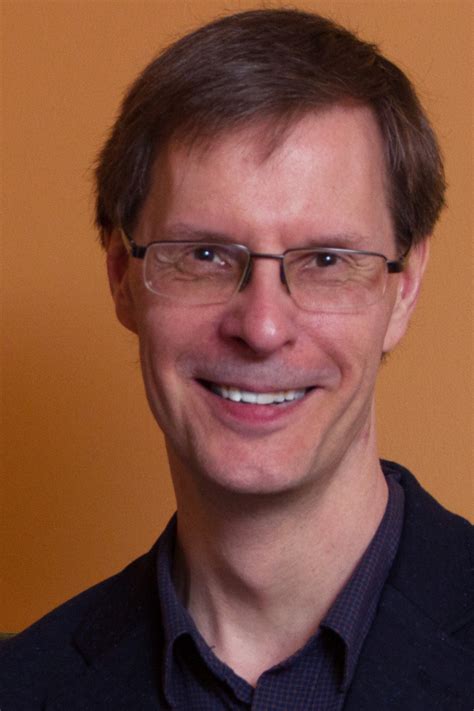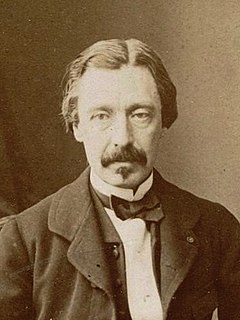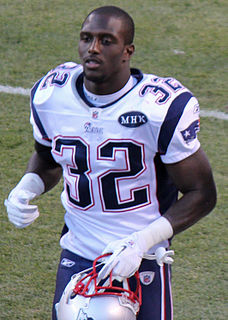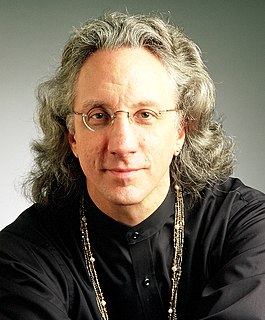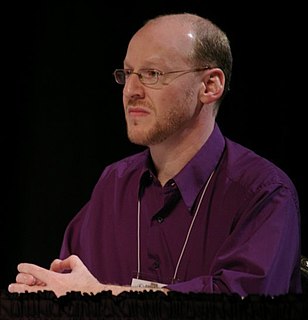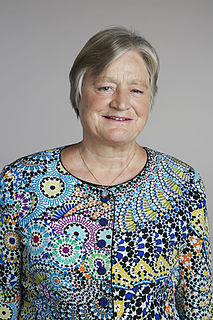Top 246 Predictions Quotes & Sayings - Page 4
Explore popular Predictions quotes.
Last updated on November 13, 2024.
All those predictions about how much economic growth will be created by this, all of those new jobs, would be created by the things we wanted - the extension of unemployment insurance and middle class tax cuts. An estate tax for millionaires adds exactly zero jobs. A tax cut for billionaires - virtually none.
I have been doing technology foresight for a number of years now on the level of scenario design, primarily. I want to become more rigorous with research methodology and statistical methods. I want to shift from creating clever SF scenarios to being a professional forecaster able to make rigorous predictions.
We are going to see a great number of articles in the future from so-called experts and public officials. They will warn about more violence, more kidnappings, and more terrorists. Mass media, the armed forces, and intelligence agencies will saturate our lives with fascist scare tactics and 'predictions' that have already been planned to come true.
Wayne Gretzky's talent doesn't come from studying everything he's experienced in hockey and making long-term game plans. It comes from constantly taking in all the data that's happening in the moment on the ice, and instantly generating constant predictions based on super-efficient mental models he's built in his head. Technology has to work more like Gretzky.
the truth and value of a theory does not depend on the number of people who are interested in it - otherwise you might compare the number of people who follow the predictions of astrologers in the daily press with those who attend lectures by Einstein, and conclude that astrology was more valuable and true than physics.
One of the predictions that I was the first to make is now materializing, and that prediction was that Obama isn't going away. That Obama is going to hang around Washington and do everything he can to undermine the next president, particularly if and when the next president tries to unravel any of the gigantic web of deceit and debauchery that Obama has implemented as president.
What we face in Canada are multiple overlapping crises. We have the climate crisis, which is screaming down on us - all of the predictions are coming true even faster than the scientists thought. We have the inequality crisis, where the Panama Papers are a great reminder that the one per cent have actually created their own economy. We still have the crisis of child poverty, which has never been dealt with despite decades of concerned words from politicians.
Gu was a worrier, a neurotic curmudgeon. If he had a headache, it was a brain tumor; if it looked like rain, this year's harvest was ruined. This was his way of controlling the situation, his lifelong strategy for always coming out ahead. Now, when reality looked more dire than any of his fatalisitic predictions, he had no choice but to turn tail and charge in the opposite direction.
On the conservative side, today's libertarianism is far more dogmatic and devoid of qualification than the liberalism of Adam Smith or J.S. Mill. Like Marxism, libertarianism is a utopian worldview based on an economic-determinist vision of history. Unlike Marxism, libertarianism is highly specific in its predictions about the transition to the utopian world order, rendering it vulnerable to fact.
Well I'm not making predictions. But the point I can - what I can say to you to contribute to your thinking is as somebody who has been out knocking on doors, doing the street corners, speaking to constituents right across the country is that the Government - that people understand that the Government's message of jobs and growth is addressing their concerns and they have a level of - a high level of confidence that Malcolm Turnbull and Scott Morrison are the people who can deliver.
Of the properties of mathematics, as a language, the most peculiar one is that by playing formal games with an input mathematical text, one can get an output text which seemingly carries new knowledge. The basic examples are furnished by scientific or technological calculations: general laws plus initial conditions produce predictions, often only after time-consuming and computer-aided work. One can say that the input contains an implicit knowledge which is thereby made explicit.
Science gains from it [the pendulum] more than one can expect. With its huge dimensions, the apparatus presents qualities that one would try in vain to communicate by constructing it on a small [scale], no matter how carefully. Already the regularity of its motion promises the most conclusive results. One collects numbers that, compared with the predictions of theory, permit one to appreciate how far the true pendulum approximates or differs from the abstract system called 'the simple pendulum'.
My colleagues in elementary particle theory in many lands [and I] are driven by the usual insatiable curiosity of the scientist, and our work is a delightful game. I am frequently astonished that it so often results in correct predictions of experimental results. How can it be that writing down a few simple and elegant formulae, like short poems governed by strict rules such as those of the sonnet or the waka, can predict universal regularities of Nature?
I think the NFL season starts with the first three or four games and all the predictions come out. You're either great on offense, bad on defense, great on defense, bad on offense. You're either going to have a Super Bowl chance or you won't. And I think after that, people kind of think everything's set in stone.
Suppose one who had always continued blind be told by his guide that after he has advanced so many steps he shall come to the brink of a precipice, or be stopped by a wall; must not this to him seem very admirable and surprising? He cannot conceive how it is possible for mortals to frame such predictions as these, which to him would seem as strange and unaccountable as prophesy doth to others. Even they who are blessed with the visive faculty may (though familiarity make it less observed) find therein sufficient cause of admiration.
Predictions of the future are never anything but projections of present automatic processes and procedures, that is, of occurrences that are likely to come to pass if men do not act and if nothing unexpected happens; every action, for better or worse, and every accident necessarily destroys the whole pattern in whose frame the prediction moves and where it finds its evidence.
I started a company called Pixel Qi and the principal of as we're going, smartphones were happening, but as we go forward, the predictions were five devices per person. Do you want to charge each one of those every night to try to get them on a full charge when you're walking around? Smartphones don't even last a day without a recharge now.
Astrologers were greatly impressed, and misled, by what they believed to be confirming evidence-so much so that they were quite unimpressed by any unfavorable evidence. Moreover, by making their interpretations and prophecies sufficiently vague they were able to explain away anything that might have been a refutation of the theory had the theory and the prophecies been more precise. In order to escape falsification they destroyed the testability of their theory. It is a typical soothsayer's trick to predict things so vaguely that the predictions can hardly fail: that they become irrefutable.
As the Olympic torch neared Lake Placid, N.Y., in 1980, signaling the opening of that year's Winter Olympics, newspapers and magazines throughout the world offered predictions on who would win medals in the major sports. Not a single publication gave the American men's hockey team a chance against the world powers.
I’ve been doing this a long time, and I’ve come to learn that predictions don’t mean much. Too much lies outside the realm of medical knowledge. A lot of what happens next comes down to you and your specific genetics, your attitude. No, there’s nothing we can do to stop the inevitable, but that’s not the point. The point is that you should try to make the most of the time you have left.
Einstein had two new predictions from general relativity. One was that light would bend. That was tested in 1919, and basically, he was proven right. The second prediction was gravitational waves, which took us 100 years to prove. The theory itself, which is thought by most to be rather obscure, you use every day, probably.
All I'm doing, all I have done for 40 years, is spend time with the best scientific experts, gain their confidence, and take advantage of their patience in explaining things to me over and over again in progressively simpler language that I can understand, so that I can read it back to them and get their sign off, where they say, "Yep, that's it, Al. You've got it." When I understand it, I know I can explain it to other people. When the scientists' predictions end up being true, I see that as an opportunity to say to people, "Listen carefully to what they're saying now."
The fact that we have been able to develop a successful science, which issues in ever more accurate predictions and broader explanations, is the real ground for confidence that we are in a position to gain knowledge of the world around us. At the same time, one might ask how it is that the cognitive equipment we have came about, and here, no doubt, our evolutionary origins are relevant.
To know whether you can trust a particular intuitive judgment, there are two questions you should ask: Is the environment in which the judgment is made sufficiently regular to enable predictions from the available evidence? The answer is yes for diagnosticians, no for stock pickers. Do the professionals have an adequate opportunity to learn the cues and the regularities? The answer here depends on the professionals' experience and on the quality and speed with which they discover their mistakes.
I first came into the labor force in 1941 when the minimum wage was 40 cents an hour, and that was my first job. And each time that we've tried to boost the lower level of salary for the most underpaid workers, there have been predictions of catastrophe. But each time, in [m]y opinion, the change has helped our Nation and its economic strength.
The only basis for even talking about global warming is the predictions spewed out by computer models. The only quote/unquote "evidence" of global warming is what models are predicting the climate and the weather will be in the next 50 to 100 years. Now, what those models spit out is only as good as the data that's put in, and it's an absolute joke. In terms of science, it's a total joke. There is no warming, global or otherwise!
In the late 1960s, there were alarming predictions that worldwide famine was around the corner. I wondered if humans had already lost the race, overrun the Earth's capacity. I let one question lead to the next, and unearthed information that would forever change my life: Not only is there enough food in the world to feed every man, woman, and child on Earth, there is enough to make us all chubby.
Predictions are uttered by prophets (free of charge); by clairvoyants (who usually charge a fee, and are therefore more honored in their day than prophets); and by futurologists (salaried). Prediction is the business of prophets, clairvoyants, and futurologists. It is not the business of novelists. A novelist's business is lying.
Your imagination is the single most important asset you possess. Your imagination is your power to create mental pictures of things that don't exist yet and that you want to bring into being. Your imagination is what you use to shape your future. And so in your own way, you are a prophet. You generate countless predictions every day. Your imagination is the source,tirelessly churning out mental pictures of what you'll be doing in the future.
It is easy to obtain confirmations, or verifications, for nearly every theory-if we look for confirmations. Confirmations should count only if they are the result of risky predictions... A theory which is not refutable by any conceivable event is non-scientific. Irrefutability is not a virtue of a theory (as people often think) but a vice. Every genuine test of a theory is an attempt to falsify it, or refute it.
Most of Marx's predictions have failed to materialize, and his labor theory of value and other ideas have been proven wrong. Marx failed to recognize the incentive system built into the capitalist model - consumer choice and the profit motive of the entrepreneur. The irony is that capitalism, not socialism or Marxism, that has liberated the worker from the chains of poverty, monopoly, war, and oppression, and has better achieved Marx's vision of a millennium of hope, peace, abundance, leisure, and aesthetic expression for the 'full' human being.
We were required to predict a soldier's performance in officer training and in combat, but we did so by evaluating his behavior over one hour in an artificial situation. This was a perfect instance of a general rule that I call WYSIATI, "What you see is all there is." We had made up a story from the little we knew but had no way to allow for what we did not know about the individual's future, which was almost everything that would actually matter. When you know as little as we did, you should not make extreme predictions like "He will be a star."
In this acausal world, scientists are helpless. Their predictions become postdictions- Their equations become justifications, their logic, illogic. Scientists turn reckless and mutter like gamblers who cannot stop betting. Scientists are buffoons, not because they are rational but because the cosmos is irrational. Or perhaps it is not because the cosmos is irrational but because they are rational. Who can say which, in an acausal world?
Some of the most wonderful aspects and consequences of evolution have been discovered only recently. This is in stark contrast to creationism, which offers a static view of the world, one that cannot be challenged or tested with reason. And because it cannot make predictions, it cannot lead to new discoveries, new medicines, or new ways to feed all of us.
Now companies tend to mine gigantic databases for insights into what might happen six months from now. That might always be valuable, but there's a different kind of value - and a competitive edge - in processing ongoing streams of data through a software model that can quickly and constantly make predictions about, say, whether a certain customer is going to defect, or an aircraft is going to run into trouble.
Astrology ... makes vague predictions that can always be adapted after the fact to fit observations, as we'll see. Astrologers don't seek causes at all, for a good reason: There isn't any cause to astrology. If you look for some underlying reason, some connection between the stars and planets and our lives, you won't find any. For astrology to sell, buyers must not seek out the fundamental principles behind it, because if they do they'll see that there is none.
Our creationist detractors charge that evolution is an unproved and unprovable charade — a secular religion masquerading as science. They claim, above all, that evolution generates no predictions, never exposes itself to test, and therefore stands as dogma rather than disprovable science. This claim is nonsense.
I didn't like doing predictions. It's certainly true that right now - and this could change tomorrow - but, right now there is no clear way for Putin to lose power. There seems little chance that a street revolution could unseat him; that's just not how things are going to work in Russia. And it seems as if the very tiny number of people who control the economy and who control politics in Russia are loyal to him.
Despite all the dire predictions made in 2001, the Afghans have given the international community, its aid workers and soldiers a large window of opportunity to repair the damage done by 25 years of war. That window, which has stayed open for nearly five years, with amazing good will from the Afghans, is threatening to close unless the world wakes up and deals with the crisis.
We made it. Despite the fear and predictions of doom. We made it. Even though there were days when we were tired and there were days when we forgot who we were. We made it. And we must thank the stars for this. And the birds for their beautiful songs. And the strangers who were careful to smile. We made it.
These proven positive consequences of elevated CO2 are infinitely more important than the unsubstantiated predictions of apocalypse that are hypothesized to result from global warming, which itself, may not be occurring from rising atmospheric CO2 levels. The aerial fertilization effect of atmospheric CO2 enrichment is the only aspect of global environmental change about which we can be certain; and to restrict CO2 emissions is to assuredly deny the biosphere the many benefits that accrue from this phenomenon.
People ask me what my predictions are for publishing and how digital is changing things and I tell them my only real prediction is that is it's all changing. Amazon, Google and all of those things probably aren't the enemy. The enemy right now is simply refusing to understand that the world is changing.
Access to supercomputers. The science is well ahead of our ability to implement it. It's quite clear that if we could run our models at a higher resolution we could do a much better job-tomorrow-in terms of our seasonal and decadal predictions. It's so frustrating. We keep saying we need four times the computing power. We're talking just 10 or 20 million a year-dollars or pounds-which is tiny compared to the damage done by disasters. Yet it's a difficult argument to win.
I just thought making machines intelligent was the coolest thing you could do. I had a summer internship in AI in high school, writing neural networks at National University of Singapore - early versions of deep learning algorithms. I thought it was amazing you could write software that would learn by itself and make predictions.
If to enjoy even an enjoyable present we must have the assurance of a happy future, we are “crying for the moon.” We have no such assurance. The best predictions are still matters of probability rather than certainty, and to the best of our knowledge every one of us is going to suffer and die. If, then, we cannot live happily without an assured future, we are certainly not adapted to living in a finite world where, despite the best plans, accidents will happen, and where death comes at the end.


